Identifying Different Types of Biases: A Guide for Absorbing News
For many of us, scrolling through social media at this time, our hearts are inundated with pictures and messages from those in Israel and Palestine. During this period it is important to remember that our identity(ies), personal associations, and general view of the world, will all impact how we process and absorb the news.
The biases we carry, both conscious and unconscious, can inadvertently perpetuate stereotypes and contribute to dehumanizing narratives. Bias is a natural part of human cognition; it helps us form identities and make sense of the vast information around us. However, acknowledging the distortions caused by these biases is essential. By being aware of our biases, we can better understand our perspectives and approach news with objectivity. Research indicates that in times of conflict, when polarization and an “us vs. them” mentality prevail, recognizing our biases can mitigate stigmatization and nurture empathy.
At ALLMEP, with staff and members from both Israel and Palestine, we are working as a team to be aware of how our grief can lead to categorizations and dehumanizing stereotypes. We know that in the coming days and weeks, as heartbreak and loss increases, understanding our biases will be crucial to ensure we are not driving the divide further. We, and our members, are striving to hold space for empathy and understanding in these devastating times.
Consider biases, ask questions, and explore perspectives:

⚓️ Anchoring Bias: The inclination to settle on the first piece of information we hear and weigh all other information against it.
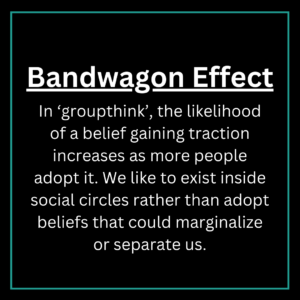
👥 Bandwagon Effect: In ‘groupthink’, the likelihood of a belief gaining traction increases as more people adopt it. We like to exist inside social circles rather than adopt beliefs that could marginalize or separate us.
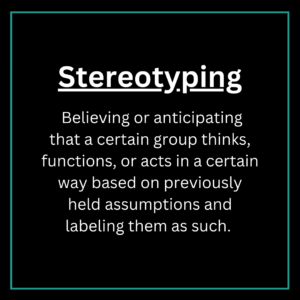
🎭 Stereotyping: Believing or anticipating that a certain group thinks, functions, or acts in a certain way based on previously held assumptions and labeling them as such.
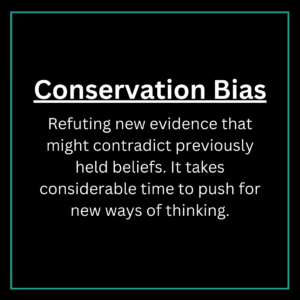
⏳ Conservation Bias: Refuting new evidence that might contradict previously held beliefs. It takes considerable time to push for new ways of thinking.
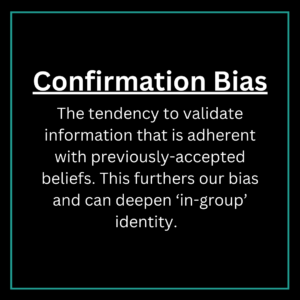
👍👎 Confirmation Bias: The tendency to validate information that is adherent with previously-accepted beliefs. This furthers our bias and can deepen ‘in-group’ identity.
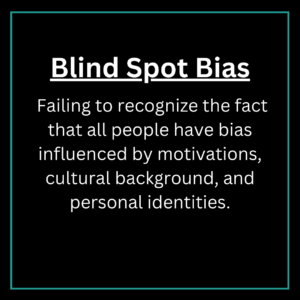
● Blind Spot Bias: Failing to recognize the fact that all people have bias influenced by motivations, cultural background, and personal identities.
Although biases are natural, it is crucial that we are aware of them and recognize that the furthering of these biases, when unchecked, can lead to increased ‘othering’ and only heighten polarization. Dehumanization of the ‘other’ is less likely when civil society between peoples is strong.
📖 Source: This blog was inspired by 20 Cognitive Decisions that Screw Up Your Decision Making, by Shana Lebowitz and Drake Baer. Cognitive Biases That Screw up Decisions (businessinsider.com)
📚🔍 Additional Resources:
- Overcoming the Barrier of Narrative Adherence in Conflicts Through Awareness of the Psychological Bias of Naïve Realism.
- Flexibility Mindsets: Reducing Biases that Result from Spontaneous Processing.
- What We Want is What We Get: Group-based Emotional Preferences and Conflict Resolution.
- Ethno-political Socialization of Young Children in Societies Involved in Intractable Conflict: The Case of Israel.
- Political Games of Attack and Defense.
